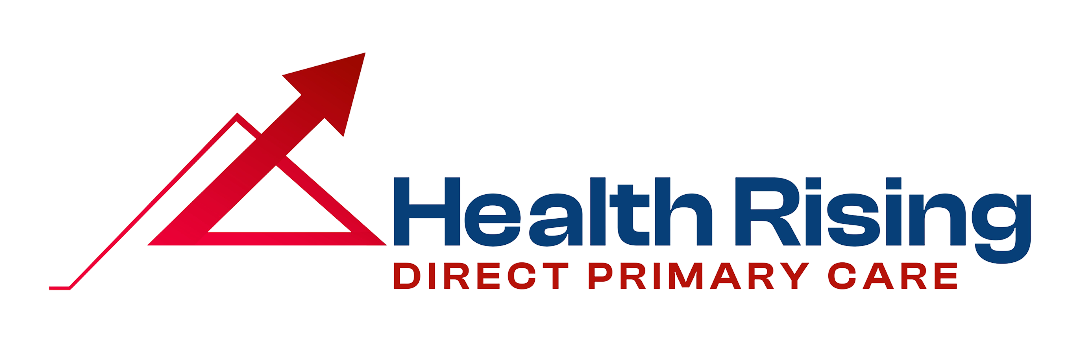Most people can feel it, even if they cannot fully explain it. The wait times, the rushed visits, the surprise bills, and the endless back-and-forth with insurance companies all signal the same problem. Something about the current system is not working. At Health Rising DPC, we often hear the same question in different forms: Why is it so hard to get good care when I’m already paying so much for insurance?
The answer lies in the model itself. To understand why insurance-based healthcare is failing us, we have to look at the incentives, the limitations, and the hidden toll it takes on your health. More importantly, we need to talk about what we can do instead.
Direct Primary Care is a return to what medicine should have always been. Care should be personal, preventative, and focused on the patient.

The Hidden Costs of Insurance-Based Healthcare Systems
When most people think of healthcare costs, they picture their monthly premium or the bill that arrives after a procedure. But the real costs of insurance-based care run much deeper.
Time is one of the biggest hidden expenses. Patients wait weeks for appointments only to spend ten minutes with a provider who barely looks up from the computer. Those ten minutes are tightly managed, not by the doctor’s judgment, but by the billing codes that determine what can be reimbursed. If your concern does not fit a narrow definition, it might not even be addressed.
There is also the emotional cost. When every visit feels like a transaction, trust suffers. Instead of having a relationship with a doctor, many people feel like they are rotating through a system that barely remembers their name. These interactions leave people feeling unheard and unsure. Often, they also receive a bill they did not expect.
And let’s not forget the paperwork. Insurance-based care thrives on forms, authorizations, and denials. Every step of care becomes a negotiation between what you need and what insurance decides it will cover. The result is not just frustration. Delays in care can make small problems worse. Quick fixes often fail, and these systemic delays are part of the reason why.
Why Insurance-Based Healthcare Prioritizes Quantity Over Quality
One of the least discussed realities of the insurance-based model is how it shapes doctor behavior. The more visits and procedures a clinic can bill, the more revenue it earns. This system rewards volume rather than value.
As a result, care becomes fragmented. You might see one provider for blood pressure, another for fatigue, and a third for stress. But no one puts the pieces together. Specialists work in silos, primary care physicians are overwhelmed, and patients are left managing their own coordination.
The problem is not the doctors. It is the structure they are forced to operate in. With fifteen-minute visits and complex documentation requirements, there simply is not enough time to understand your lifestyle, habits, or goals. You get a prescription or a referral, but rarely a real plan.
This reactive model leads to more medications, more testing, and more burnout. What it does not lead to is better health.
How Insurance-Based Healthcare Fails Preventive Care
Preventive care should be the foundation of any health system. But under the insurance model, it is often an afterthought. Coverage may exist for annual exams or basic labs, but deeper prevention (like nutrition guidance, stress support, or sleep counseling) is rarely included.
Why? Because preventive care is not easily quantifiable or billable. There is no code for spending thirty minutes discussing how to make home cooking easier. There is no form for walking through a patient’s sleep routine or helping them navigate a stressful life transition.
So instead of getting the help they need to prevent illness, patients are often told to “keep an eye on it” until something becomes serious enough to treat. This approach is not only inefficient. It is harmful.
At Health Rising DPC, we believe that preventative health screenings should be tailored, not templated. Prevention should be woven into every visit instead of being tacked on once a year.
Direct Primary Care: A Better Path Than Insurance-Based Healthcare

If the traditional system is failing, what comes next? Direct Primary Care offers a clear and compelling answer.
In the DPC model, patients pay a flat monthly membership for full access to their doctor. There are no copays, no deductibles, and no surprise bills. Instead of navigating insurance, patients get care directly. The experience becomes simple, honest, and timely.
This shift changes everything. Without billing constraints, doctors can spend more time with each patient. Visits are longer, follow-up is proactive, and care is truly customized. Whether you are managing a chronic condition or trying to optimize your lifestyle, your doctor becomes a true partner.
Removing the middleman allows DPC to bring the focus back to what matters most: your health.
Benefits of Removing Insurance from Primary Healthcare
The first thing people notice in DPC is access. You can text or call your doctor directly. You do not have to wait weeks. You do not have to explain your symptoms to a nurse, then a front desk staff, then a provider who just met you.
Instead, you build a relationship over time. Your doctor knows your history, your preferences, and your goals. That kind of familiarity leads to better decisions, more effective plans, and fewer delays.
You also get transparency. Pricing is clear. There is no guesswork, no billing games, and no stress about what will be covered.
And the outcomes speak for themselves. When patients feel safe, seen, and supported, they engage more fully in their health journey. They take action. They stay consistent. They improve.
Lifestyle Medicine and Why Insurance-Based Healthcare Falls Short
You already know that food, movement, sleep, and mindset matter. But knowledge alone does not lead to change. People need consistent support.
In an insurance-based clinic, there is often no room for real lifestyle coaching. Doctors want to help, but they are stretched too thin. So instead of guidance, patients get handouts. Instead of a thoughtful plan, they receive a prescription.
Direct Primary Care allows for a different kind of conversation. We can talk about what is realistic in your life, not just what looks good on paper. We can explore barriers, test solutions, and celebrate progress together.
Whether it is reshaping your diet through whole foods over macros, improving your sleep quality, or lowering your stress load, lasting change starts with support. And support starts with time.
If you have ever felt like your doctor was rushing out the door, you are not alone. That is a structural problem. But it is also one that can be solved. Lifestyle medicine only works when your care model makes space for it.
Why More People Are Leaving Insurance-Based Healthcare for Real Health

Healthcare burnout is no longer just a doctor issue. It is a patient issue too. People are exhausted by the effort it takes just to be seen, let alone be heard. They are tired of short visits, generic answers, and chronic symptoms that never seem to improve.
At the same time, doctors are leaving traditional systems in large numbers. Many are turning to models like Direct Primary Care because they want to practice medicine the way they were trained. They want to listen, to help, and to heal.
This is not just a professional shift. It is a cultural one. More people are stepping away from the rush of reactive medicine. They are choosing something quieter and more consistent. They are choosing healthcare that feels human again.
As the DPC model grows, patients and doctors alike are realizing that healthcare does not have to feel this hard. It can be clear. It can be connected. It can be healing.
To better understand how lasting health comes from steady effort, not shortcuts, read Why Quick Fixes Fail and Small Wins Matter for Lasting Health.
Conclusion: Why Insurance-Based Healthcare is Failing and What You Can Choose Instead
The insurance-based model is not just inconvenient. It is fundamentally misaligned with long-term health. It prioritizes transactions over relationships, speed over depth, and treatment over prevention.
At Health Rising DPC, we believe the time has come for a new model. One that offers consistent care, clear pricing, and a true partnership between doctor and patient. One that supports healing through trust, time, and the full picture of your life.
If you are ready to stop feeling like a number and start feeling cared for again, we are here to welcome you.
Join Health Rising DPC and take the first step toward care that actually cares. Become a member today or learn more about our approach.













